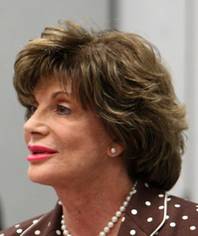Wednesday, Oct. 5, 2011 | 11:03 p.m.

Shelley Berkley

Dean Heller
Sun coverage
The Senate’s effort to punish China for manipulating its currency has not come to an end, nor has the bill they’re considering yet come to a vote on its merits.
But over in the House, Nevada Rep. Shelley Berkley isn’t waiting for such procedural pleasantries to give her opinion on her Senate rival’s stance on the legislation, which she summed up in one word: shameful.
“Chinese currency manipulation policies have cost the U.S. approximately 3 million jobs. We have lost over 14,000 jobs” in Nevada, Berkley said. “That’s completely unacceptable. But what’s even more unacceptable is that Dean Heller sided with the Chinese government over Nevada’s unemployed...Who do you work for, Dean? The Chinese? The Chinese government? Or Nevada’s working families?”
Berkley’s screed is the most vitriolic to emerge from Congress over the China currency issue, which is dividing party leaders in the House and Senate.
The Senate voted Tuesday on a procedural motion to advance a bill that would place tariffs on imports from countries who intentionally depress the value of their currencies, as the U.S. has charged China has been doing. Federal Reserve Chairman Ben Bernanke has said the move is keeping the U.S. from a faster economic recovery.
To Senate Majority Leader Harry Reid, that’s translated to mean one thing: jobs. He identified the currency bill as the top item in his job-creation agenda for this month, moving it through the Senate ahead of President Barack Obama’s jobs package.
On Tuesday, 78 senators voted with him to advance the debate about the issue. But not Nevada Sen. Dean Heller.
Nineteen Senators — 16 Republicans and three Democrats — as well as Republican leaders in the House, dug in, arguing the bill overstepped Congress’ role and risked provoking a trade war with China in the midst of economic crisis.
Berkley’s words, Heller suggested Wednesday, show that she’s out of touch with what Nevada’s interests really are with regard to China.
“Inciting a trade war with China will not create jobs. In my own state of Nevada, a trade war will hurt tourism. It would stifle growth in renewable energy development and increase costs at a time when Americans can least afford it,” Heller said on the Senate floor. “It seems job creation and economic growth has taken a back seat to political posturing here in Washington.”
The politics of the issue, though, aren’t as clean as either side would like them to be.
The majority of Senate Republicans and a bloc of Republicans in the House have willingly backed at least discussing this legislation.
Heller says he doesn’t begrudge those Republicans their frustrations — “China is manipulating its currency,” he said Wednesday — but maintains the momentum behind it is politics that sound good but make for bad policy.
“This isn’t going anywhere,” he said. “Everybody knows we’re just throwing out this bone, which I think doesn’t send a good message.”
On the other side of the aisle, Sens. Claire McCaskill of Missouri, a moderate, and Washington Sens. Maria Cantwell and Patty Murray, both more reliably liberal, aren’t the only Democrats who’d rather not discuss the China currency bill any further. President Barack Obama isn’t that keen to talk about it either.
Obama has demurred to discuss the particulars of Reid’s legislation. Meanwhile, the Department of Treasury already has been working for months on the issue with China.
That’s the process Heller points to.
It’s not that Congress has no role or that China isn’t manipulating its currency, but the proposed legislation is the wrong vehicle for the fight, he said.
“For once, I agree with the president. Trade wars do not create jobs,” he said in a statement.
The idea that Heller might have more faith in the Obama administration to execute a point of monetary and jobs-related policy is an irony Berkley didn’t really have an explanation for on Wednesday.
“I don’t speak on behalf of the president of the United States. I speak on behalf of the people of the state of Nevada,” she said on a conference call her Senate campaign arranged to discuss Heller’s vote. “We’re already in a trade war, and Nevada working families are losing. This legislation is going to level the playing field.”
The Treasury Department has estimated China’s intentional depression of its currency — a tactic that keeps the prices of its exports artificially low — amounts to the government subsidizing about 20 to 30 percent of its exports. Seen from the U.S. exporter’s perspective, that means about an equivalent markup on U.S. exports — the sort of effective tariff that puts the U.S. at a severe competitive disadvantage and has helped drive outsourcing for years.
But over the last decade, Nevada’s exports to China have increased from $14 million to $456 million a year. The icnrease has created about 2,500 jobs, based on the Commerce Department’s estimated calculation of how exports relate to job creation.
It’s not a huge part of the economy yet, but the import-export balance is at the root of the concerns of lawmakers like Heller who are objecting to the Senate bill. If the U.S. forces the Chinese to voluntarily inflate their currency in an attempt to raise the effective tariff on U.S. goods, the Chinese could retaliate by putting a real tariff on the U.S. to reset the balance.
Whether or not they would institute such trade barriers is a decision that will take place at a level far higher than Nevada and will depend on several factors, including China’s trade relationships with other countries and how China views the large cache of U.S. debt it holds (it gives China a larger interest in the economic health of the U.S. than it might have otherwise).
But the effects will be felt close to home.
The Economic Policy Institute, a liberal-leaning think tank, estimated that between 2001 and 2010, the U.S. lost 3 million jobs and Nevada lost 14,800 jobs due to unfair Chinese currency manipulation practices.
The EPI study doesn’t list which industries those jobs were stripped from or how China’s currency manipulation contributed to the losses.
Nevada’s economy, it should be noted, doesn’t react to trade stimuli the same way as other states. While Nevada’s manufacturing sector is growing, it’s tiny. The state workforce is still dominated by services related to the tourism industry, a business that does well only when others are doing well.
Nevada may not have to worry as much as a state like Ohio about cheap Chinese products boxing out their bedrock industries, but Nevada shares their fate if a wash of unemployment there means fewer Ohioans visit Las Vegas.
But these days, it’s becoming more important for Nevada to have good public relations with the Chinese.
Chinese visitors are the fastest-growing segment of the Vegas tourism economy, according to the Las Vegas Convention and Visitors Authority.
It’s clientele that’s also learning about Vegas mostly through official agencies and word of mouth. The LVCVA says it does little traditional advertising in China, simply because the population is too large to reach in a targeted fashion.
But word of mouth has paid dividends beyond the casino floors. What started in the casinos has already crept into other sectors of the Nevada economy: Chinese corporations are now backing the biggest renewable energy ventures — including manufacturing ventures that could potentially employ thousands of Nevadans — in the southern part of the state.
Chinese corporations with close ties to the state central banks might not appreciate a public dressing-down over fiscal practices.
But Berkley thinks the issues of currency, investment and tourism are separable.
“We welcome Chinese investment, but they can’t have our jobs,” Berkley said. “We want Chinese businesses to come into the state, investing and creating American jobs — that’s one thing; I encourage that. I encourage tourists from China that come and enjoy our gaming and tourism industry...But it’s totally separate and apart from the Chinese government’s deliberate manipulation of their currency.”
Heller, meanwhile, says the idea that you can separate one from the other is wishful thinking and could easily upset a relationship between Nevada and China.
“It is an issue. No one’s disagreeing about that,” Heller said. “But I worry about what impact it’ll have on tourism, what impact it will have on the agricultural portions of the state...I don’t want to sever that relationship, and we have the potential to do it with legislation like this.”


Join the Discussion:
Check this out for a full explanation of our conversion to the LiveFyre commenting system and instructions on how to sign up for an account.
Full comments policy